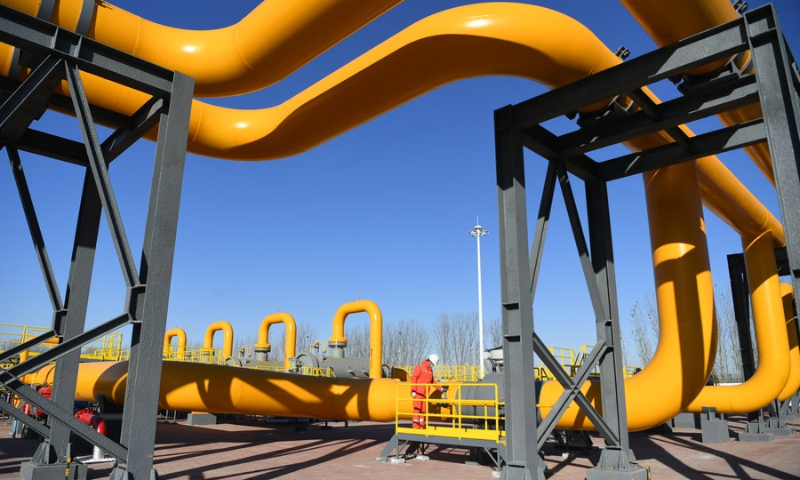GT Voice: Why is the West keen to politicize China-Russia energy cooperation?

A staff member works at the Yongqing compressor station of the Changling-Yongqing section of the China-Russia east-route natural gas pipeline in Yongqing county, North China's Hebei Province, December 3, 2020. Photo: Xinhua
Ahead of Russian Foreign Minister Sergei Lavrov's China visit, which started on Monday, Western media reports focused mainly on energy cooperation between China and Russia. Some Western politicians hold an aggressive and critical view, but admittedly, such normal bilateral cooperation is conducive to stabilizing global energy prices, especially during a sensitive period where the recent escalating Israeli-Palestinian conflict has added uncertainties to the global energy market.
Energy serves as an important piece in the jigsaw for practical cooperation between China and Russia, and also a positive force for maintaining global energy security. If China's energy supply chain were to be disrupted by zero-sum geopolitical games, it would only serve the interests of the US. The global energy market would suffer an unnecessary shock.
As has been reported recently, China's crude oil imports have surged in recent months, as refiners built up inventory and increased processing to benefit from higher profits from exporting fuel. One thing is certain: China's energy imports will be driven by economic factors, and oil exporters all over the world will have equal opportunities to have a share of China's energy imports.
Although politicians in Washington have highlighted China's trade ties with Russia since the Ukraine crisis, they have no right to pressure China to give up normal economic cooperation that is in accordance with the global trade rules.
Washington has been urging European countries to reduce their reliance on Russia's energy, but what has been the result? The US has replaced Russia as the biggest supplier of crude oil to the EU. That is a big turnaround. As reported by CNN, the US' share of Europe's crude imports increased to 18 percent in December 2022. At a time when Europe is suffering from an energy crisis and global energy prices have risen, American energy exporters have become the biggest winners.
Similar selfishness and hypocrisy can also be seen in US politicians' concern about China-Russia energy cooperation. If normal cooperation between China and Russia is disrupted, who will fill the space for China's energy imports? Of course, Western politicians hope the gap can be filled by companies from the US and its allies.
Currently, oil prices have climbed due to fears that the Israeli-Palestinian conflict could embroil the wider petroleum-producing region and threaten global output. Amid global economic uncertainty, China, as one of the world's largest crude oil importers and a critical market, needs to ensure stable energy supply, which can also safeguard the stability of the global energy market.
Despite the critical view from some Western politicians, energy cooperation has always been an important aspect of China-Russia cooperation. There is little doubt that bilateral economic and trade cooperation will continue to develop. China-Russia economic cooperation does not target any third party, and it does not tolerate any third party's interference or coercion.
The US Energy Information Administration (EIA) said in September that record volumes of crude oil were imported into China during the first half of 2023 because of factors such as refinery expansions in the country. China imported an average of 11.4 million barrels of crude oil per day in the first half of 2023, a 12 percent increase from 2022's annual average of 10.2 million barrels per day. The US EIA said China sourced much of the additional crude oil it imported in the first half of 2023 from Russia, Iran, Brazil, and also the US. It seems China's energy imports are diversified. However, the US, which is a beneficiary of China's increased energy imports, is attempting to make China's energy imports a tool to exert pressure on Beijing, and meanwhile lead other Western countries to politicize energy exports to China.
China has the right to expand energy cooperation with any trading partner according to its own needs and global trade rules. Amid global economic uncertainty, it is necessary for China to ensure its energy security, which is also conducive to the stability of the global energy market.
Photos
Related Stories
- Chinese FM meets Russian counterpart
- GT Voice: Western smears can’t conceal economic benefits from BRI
- Cross-border highway bridge promotes development of China-Russia relations
- Chinese tourists flock to Russian Far East during Golden Week
- Russia to safeguard int'l fairness, justice with China, says Putin
- Interview: Russia, China share responsibility to promote formation of multipolar world order, says scholar
Copyright © 2023 People's Daily Online. All Rights Reserved.









